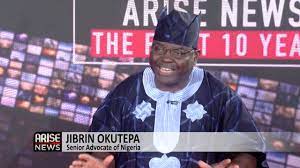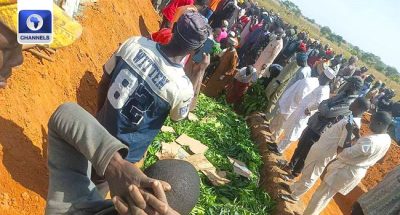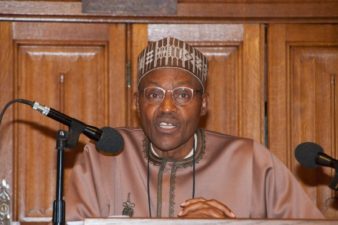*Says many things wrong not with judges but judiciary
*Salutes judges for still keeping Nigeria on top despite temptations
*Reveals how executive places judiciary to make their decisions manipulative
By BASHIR ADEFAKA
“Nigerian judiciary, judges in Nigeria, without sounding patronising, have endured very excruciating circumstances. Otherwise, if they were to be this other department of government where money change hands and anybody can change and do whatever they want to do and the politician propounded the theory of ‘what money cannot do, more money can do’, Nigeria would have collapsed.”
Amidst cries for the judiciary in the country to be able to deliver, not only untainted quantity but also more importunately, trust and integrity-based quality and transparent justice in the ongoing petitions before the Presidential Election Petitions Tribunal in the Nigeria’s capital city of Abuja, a constitutional lawyer Wednesday made revelations that keep tongues wagging about the system.
Making these revelations was Nigerian legal practitioner and Senior Advocate of Nigeria (SAN), Mr. Jibrin Okutepa, who revealed the pathetic and excruciating conditions under which judges, who are expected to deliver justice in the Nigerian judiciary system, are deliberately placed by the political class in tight corner to make their decisions manipulative.
The lawyer is one of several legal counsels that will stand in for Asiwaju Bola Ahmed Tinubu, President-elect and presidential candidate of the ruling All Progressives Congress (APC) in the last presidential election of Saturday February 25, 2023, at the Presidential Election Petitions Tribunal in Abuja against presidential candidate of the Labour Party (LP), Mr. Peter Obi.
He was speaking at a time all eyes are on the nation’s judiciary in connection to its ability to deliver untainted justice in the all-important electoral case before it, which is capable of making or marring the image of Nigeria in the eyes of the international community.
Jibrin Okutepa, while speaking in an interview on Nigeria-based global television network, Arise News, on Wednesday, however, took a position against the yearnings of many stakeholders, which is the aspect he said the proceedings on the presidential election petitions against his client, believed to be Tinubu, by Peter Obi, does not need to be televised. Details of his submissions have been captured in this special report by The DEFENDER.
In the Arise News interview discussing “Reforming Nigeria’s Judiciary System”, Okutepa was asked if he thinks that Nigeria needs to reform its court and judiciary especially when it comes to things like election’s petitions and stripping out unnecessary procedures that cause lengthy delays.
Nigerian judiciary realistically at mercies of executive
Responding, the Senior Advocate of Nigeria, while dodging to comment on election petition matters in which he has been involved, made some revelations that call for worries.
“I have to be very careful here, I will not dwell too much on election matters because I represent one of the parties in the current litigation before the Tribunal.
“First, as a lawyer, I have implicit confidence in the Nigerian judiciary. There is no doubt that people have some perceptions that rated our judiciary…not too good position and that perception is all over. But it is for the judiciary to stand the test of time and dispel that perception as incorrect.”
Going forward he said, “When you talk about reforming Nigerian judiciary, there are so many things that are wrong not necessarily with the judges but with the judiciary itself. My Lord Honourable Justice Omeadi, former Chief Judge of Anambra State, has spoken extensively on what he called the independence of the judiciary.
“Nigerian judiciary as at today, constitutionally speaking and in theory, is independent but I have doubt whether, in practical reality, the judiciary is independent. And when you are talking about independence of the judiciary, first is the Nigerian judiciary independence in terms of the resources available to it. It does not have power to approve its budget. Nigerian judiciary does not mint currency and, so, it necessarily has to go to the executive.
“You would recall that there were litigations by JUSUN, Judicial Staff Union of Nigeria, and judgement delivered that money meant for the judiciary should be given to the judiciary. But that judgement appears to have been obeyed in brief by the executive and there are a lot of reasons for this.
“It is difficult for us to avoid some examples that are gotten from… Why did Saul sell his birthright? Because he was hungry and he needed just something from the pot of porridge to keep body and soul together.”
He went on to hit the nail in the bud saying, “So the political class appears not to want our judiciary to be financially independent. Nigeria is about the only country where I see that what legitimately belong to the judges, the executive arm of government put on advertorial as the number of cars they have bought for judges, the number of buildings they have donated as if judges are paupers and beggars.
“So, when you see that the judiciary is having a low rating in the sight of the public, one of this is that Nigerian judiciary does not have financial autonomy.
Man-know-man in recruitment of judges
“Number two, prior (to) now and in those good olden days, nobody lobbied to be made a judge. Your appearance in court, their lordships who are seated observe your character, your mean, your demeanor and your relationship with your colleagues and with the bench and the character you display in terms of the matter you have in court. It is then that they said, ‘Look, Charles, you are crossing over to this other side tomorrow.’ The emolument was not like what we have now.
“But today, to be made a judge in Nigeria, it appears to me that what you know does not matter. It is whom you know that works for you. Either whom you know as a godfather in the judiciary or as godfather in the political cycle. And I think it was the late (MKO) Abiola that said, ‘The hand of the giver is always on top’,” he expressed concerns about what the Nigerian judiciary has become under the present day system.
He continued that, “So, when you see the dwindling of jurisprudence in term of sound judgement, sound decisions, these are products of recruitment process because no one can give what he does not know or does not have. So, if we are talking about reforms, we must go back to the golden days where recruitment to the bench was a demonstration of impeccable character of the lawyer, the magistrate or the registrar,” he said.
Delivering justice on petitions amidst worrisome judicial system
Asked if that interesting submission that he made, which underscores the feeling that the judiciary at the moment is very bad and whether that concerns him when he gets something like an election petition that is fundamental to the future of the country, he laid bare his opinion as a lawyer.
“We cannot go to import judges to decide Nigerian election petitions. The election petitions across this nation must be decided by Nigerian judges and so Nigerian judges are also not judicial robots. They are human beings like you and I. They listen to Nigerians, they hear the outcry of Nigerians and judges have, with all respect, done a lot to keep democracy in the kind of democracy that we now have.
“I’m sure you would have seen that even in election petition, you recall that in Zamfara when political rascality was displayed, they were put to the strictest test of it and they lost all the people they claimed had won the elections. And it happened in other places also.
“I am praying and I am hoping that the strength of character, courage to resist the temptation of the punishment their lordships are suffering in the hands of the executive, God will give them that strength because, whether you like it or not, for those of us who go to court, almost on daily basis except on unjuridical day, sometimes you weep to see those trying their very best to cope with the volume of work in long handwriting. And you are expected to deliver X, Y, Z judgements and so the quantity of judgements now becomes more fundamental for elevation than the quality of judgements.
The temptations
“And in talking about the quality of judgements, no one can sit and read comfortably in a very harsh condition. So, judges retire home they are at the mercy of DisCo, no diesel, I was privileged to visit a presiding justice somewhere in one of the states far away. When I got to the house, even the door to his house was in pitiable condition. That’s a presiding Justice of Court of Appeal and you are expecting such a person trying a case involving humongous amount of money to resist temptation.
“And so that’s why I say that the judiciary has been put at the mercies of the executive and that is what our political class do purposely for their selfish interest” to make it more manipulative.
He spoke further by giving a seemingly funny but serious analogy saying, “Otherwise, it’s like you have food in your hand, somebody is hungry and you have the capacity to give the food. But you say ‘I will not give you this food unless you sing national anthem’, the man may not even want to sing the national anthem but he’s forced to do it. So, let me say this, that Nigerian judiciary, judges in Nigeria, without sounding patronising, have endured very excruciating circumstances.
“Otherwise, if they were to be this other department of government where money change hands and anybody can change and do whatever they want to do and the politician propounded the theory of ‘what money cannot do, more money can do’, Nigeria would have collapsed.
“So, notwithstanding this excruciating experience, perception, I am a lawyer, I may not be happy, but I cannot sit here to say that the entire judiciary is bad.
Although the politician he represents at the Tribunal was not mentioned for the duration that the interview lasted, however, our finding showed that he actually stands among a collection of many Senior Advocates of Nigeria (SANs), who have been hired to fight in the defence of APC’s Asiwaju Bola Ahmed Tinubu in the case before the court.
Televising Tribunal proceedings
On his reaction to the demand for televising of legal proceedings for restoration of trust and integrity in the process of current election petitions, he said, “I belong to this profession and it has been the ethics of this profession of considerable antiquity that judicial proceedings in Nigeria are not televised. We are not going there for drama, we are going there for serious business.
“And let’s agree with you that it will be televised, how does that televising of proceedings change a corrupt judge, for instance? Will you go and slaughter the judge? Because, judgements of court are not based on emotional outburst of the public. Because sometimes, what the public perceive as justice may not be justice, but what I would say is that our judges must deliver justice in judgements.
“Because there are some judgements in Nigeria, when matched with the law, it is absolutely not justice personified. That is why Lord Dennis is of the view that ‘A judge must be master of his court’ and if there is any rule of law or any precedent that undermines the doing of justice, it’s within the power of the judge to do all he can, legitimately, to give justice. Because if you wait for parliament to amend the law, parliament, for selfish reason, may not want to amend the law.
“For instance, in Nigeria today, you see that the only cases that have timeline within which to conclude are political cases and political cases have now overtaken all normal cases, and their lordships are overburdened. So, there is a lot we need to say but this time is not allowing us to say because, how many judges do we have? Judges are too few. In the Supreme Court, as at today, I’m not too sure their lordships are more than 12 and they head appeal from all over Nigeria.
“When it comes to election petitions, you need to have a kind of system that the Kenya has when we can prove our election petitions by affidavit evidence and lawyers demonstrating and arguing for their lordships to match the law and take decisions.




